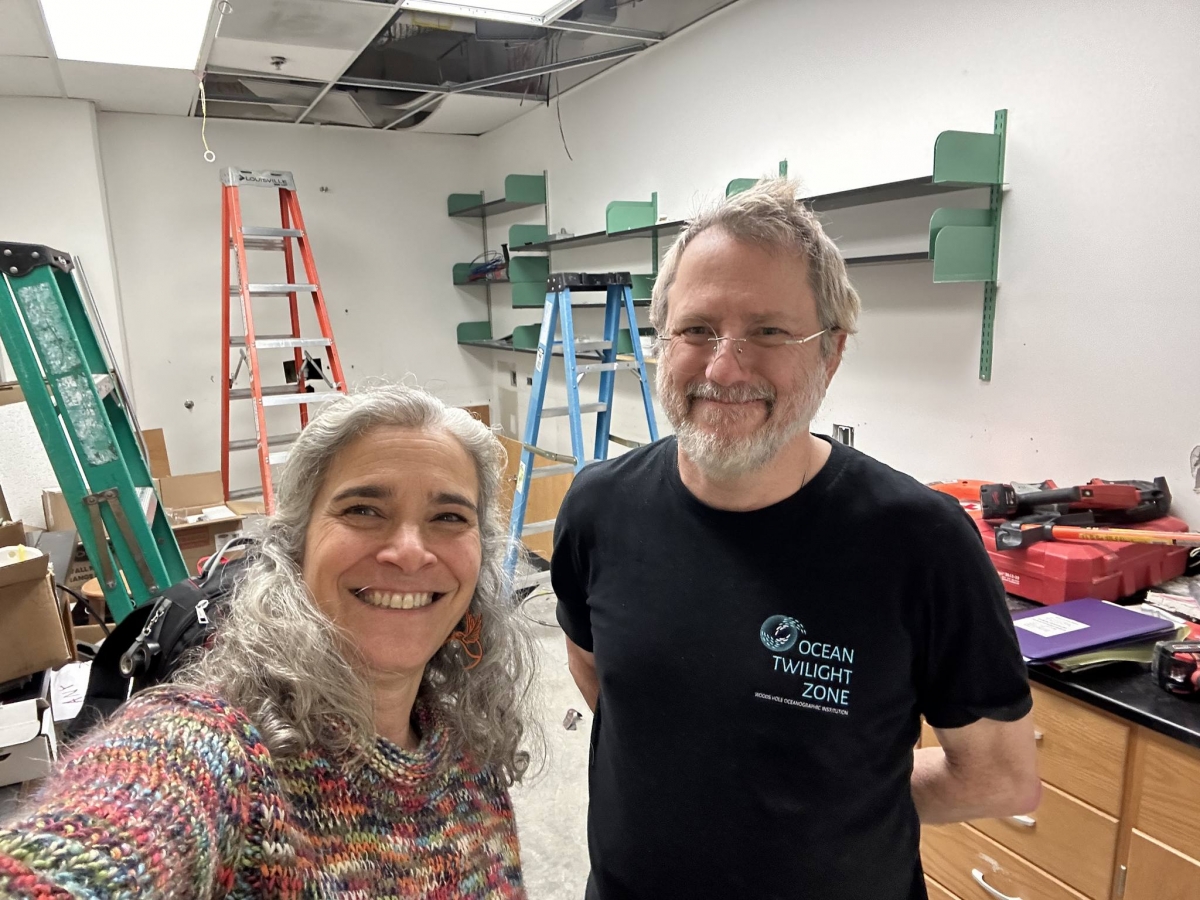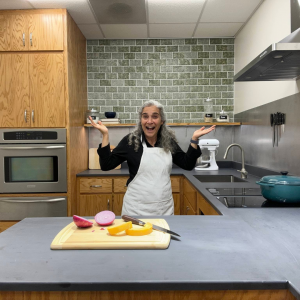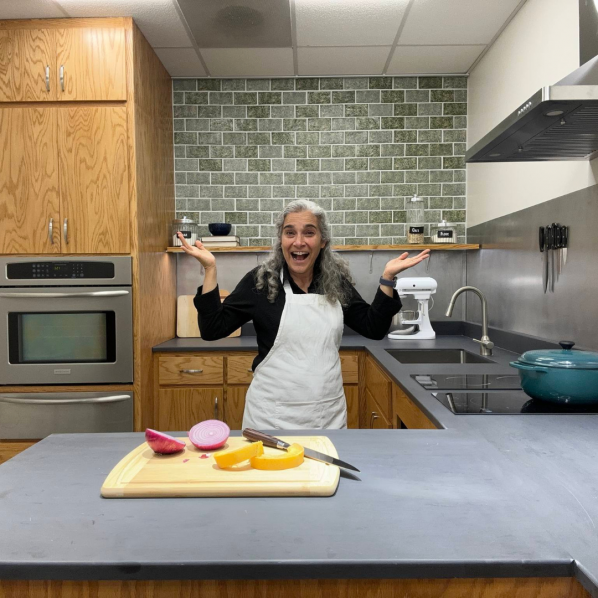BOONE, N.C. — Carla Ramsdell, practitioner-in-residence in the Department of Physics and Astronomy and sustainability liaison for the College of Arts and Sciences (CAS), proudly debuted the Sustainable Physics-Inspired Culinary Education (SPICE) Lab (physics.appstate.edu/research/spice-lab) this semester.
The 10 by 24 foot room—"small but mighty" according to Ramsdell—is a former microscopy lab located on the second floor of Garwood Hall. Ramsdell had been dreaming up the space for nearly four years. In 2021, Molly Terra '23, an interior design student at the time, created a mockup of the SPICE Lab under the guidance of Jeanne Mercer-Ballard, associate professor of interior design in the Department of Applied Design. This summer, the dream finally came to fruition.
The room's redesign was made possible with support from the Office of Sustainability, College of Arts and Sciences and Department of Physics and Astronomy, and a generous grant from the Appalachian State University Renewable Energy Initiative, a student-led, student-funded organization that seeks to install renewable energy and energy efficiency projects on campus. "They recognized the opportunity for outreach education from this location, and I am excited to work with them, in partnership with AppTV to develop cooking episodes that highlight science-based energy-efficient cooking strategies. The first of these will deput this semester," said Ramsdell.

Left: A mockup of the SPICE Lab created by App State interior design alumna Molly Terra '23 in 2021. Right: Ramsdell stands in the completed SPICE Lab in 2024. Photos submitted
The new SPICE Lab is divided into two parts. The first half is a science laboratory for researching the energy efficiency of cooking, such as continuing research to determinine the thermodynamic properties of cookware that is most energy efficient or the energy for various cooktop and oven options and strategies.
The second half of the SPICE Lab, a combined recording studio and kitchen, will be used to record online content and augment in-class instruction for Ramsdell's "Physics of Food and Cooking" course (PHY 2220). Additionally, Ramsdell is using the space to Zoom sustainable cooking classes as part of the Cooking with Purpose program. Now in its sixth semester, Cooking with Purpose is a free, online cooking series to increase awareness about how to prepare healthful food using sustainable ingredients and techniques and to showcase ingredients that are inexpensive and typically available at App State's Mountaineer Food Hub. The program—a long-term collaboration between the Office of Sustainability and the College of Arts and Sciences—is voluntary and open to all App State students. (While this semester's classes are offered on a drop-in basis, those interested in Cooking with Purpose are encouraged to register here!)
"Beyond that, the possibilities are endless...sustainable science cooking classes for community members and alumni, Zooming into other relevant classes to teach about the opportunities that exist to transform our kitchens into climate change mitigation maker-spaces and remote public speaking opportunities Zooming science of cooking demos from this lab anywhere on the globe!" shared Ramsdell.
A particularly unique feature of the SPICE Lab is the capability to track the energy to every appliance and outlet in real-time, making cooking classes more informative and providing data that can be used for research purposes. "A URL can be provided to cooking class participants to allow them to track the energy being used from the induction cooktop versus the radiant cooktop, for example, or the microwave oven versus the convection oven...This is the first kitchen to our knowledge with this capability!" explained Ramsdell, who recognized CAS electrical engineer Patrick Richardson for designing, ordering and installing the system.
The SPICE Lab also features custom tile created from local clay by Lela Arruza '23, now an alumna of the ceramics program, in collaboration with Lisa Stinson, professor of studio art in App State's Department of Art. Ramsdell described the tile as "the star of the show" in the space.
Finally, Ramsdell thanked Facilities Operations—especially project manager Benjamin Gragg—for installing the electricity and plumbing and building the cabinetry.

Ramsdell and CAS electrical engineer Patrick Richardson in the SPICE Lab space prior to renovation. Photo submitted
Outside of the SPICE Lab, Ramsdell is busy preparing for another event at the intersection of food and sustainability: Community FEaST (Food Engagement and Story Telling). For the eighth year, students, staff, faculty and community members are invited to gather around a 100-yard table in the middle of Sanford Mall to enjoy a simple, local meal while engaging in conversation about sustainable food issues and stories. The event is organized by the Appalachian Food Research for Equity Sustainability and Health (AppalFRESH) Collaborative—led by Ramsdell—and is free. This year's Community FEaST is scheduled for Tuesday, October 22, from 4:30 to 6:00 p.m.
Interested in learning more about Ramsdell and her work? Recently, she was a guest on the "Find Your Sustain Ability" podcast, hosted by Department of Sustainable Development practitioner-in-residence and Pathways to Resilience Quality Enhancement Plan associate director Laura England. During the episode, Ramsdell and England discuss Cooking with Purpose, Community FEaST and, of course, the SPICE Lab. Listen to the episode or read the transcription here: sustain.podcasts.appstate.edu/e/fysa-spice-lab.
###
About the Department of Physics and Astronomy
The Department of Physics and Astronomy’s curriculum has an applied nature that includes a core of fundamental physics courses and laboratory experiences. The department prepares graduates for a variety of scientific, teaching or engineering professions, as well as future educational endeavors. Learn more at physics.appstate.edu.
About the Appalachian State University Renewable Energy Initiative
The Appalachian State University Renewable Energy Initiative (REI) is a student-led, student-funded organization that seeks to install renewable energy and energy efficiency projects on campus. Projects can be proposed by any member of Appalachian and are carried out by the REI committee with the help of faculty and staff advisors. Since its inception in 2005, the REI has funded over 20 renewable energy and energy efficiency projects, including the Broyhill Wind Turbine, which, until recently, was the largest wind turbine in North Carolina. The REI works closely with Appalachian’s Office of Sustainability. Learn more at rei.appstate.edu.
About Sustainability at Appalachian
Appalachian State University’s leadership in sustainability is known nationally. The university’s holistic, three-branched approach considers sustainability economically, environmentally and equitably in relationship to the planet’s co-inhabitants. The university is an active steward of the state’s interconnected financial, cultural and natural resources and challenges students and others think critically and creatively about sustainability and what it means from the smallest individual action to the most broad-based applications. The university offers both undergraduate and graduate academic degree programs that focus on sustainability. In addition, 100 percent of Appalachian’s academic departments offer at least one sustainability course or course that includes sustainability, and all students graduate from programs that have adopted at least one sustainability learning outcome. Learn more at appstate.edu/sustainability.
By Lauren Gibbs & Carla Ramsdell
September 12, 2024
BOONE, N.C.

